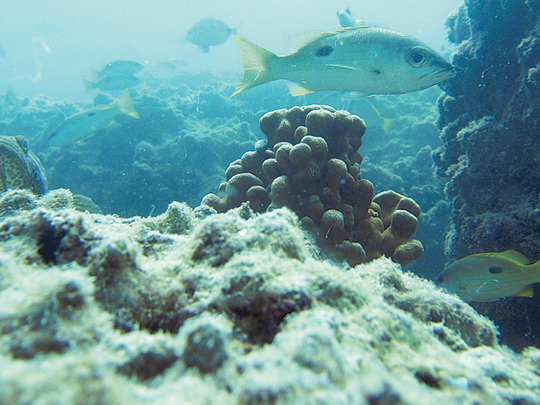
Abu Dhabi: There is hope for coral reefs despite predictions by some experts that they could be wiped out in this century. A community art project is seeking to promote public involvement in efforts to reverse the damage to coral reefs by highlighting how their destruction raises warning signs for humans at many different levels.
In a panel discussion held recently at New York University Abu Dhabi (NYUAD), Margaret Wertheim, director of the Institute for Figuring, pointed to the Crochet Coral Reef exhibition hosted by the university. The exhibition showcases an art project — led by Wertheim — that sculpts coral reefs using yarn and plastic threads.
Wertheim’s institute is an organisation dedicated to the poetic and aesthetic dimensions of science, mathematics and engineering.
“The project was conceived as a community art project to really engage people about global warming and the devastating effect on coral reefs — and this is down to the fact that the environment and conditions around them are bad,” she said.
Protecting coral reefs goes beyond environment concerns. There is an economic aspect to their conservation as coral reefs are critical to allied industries like fisheries.
Unchecked human activity is singularly responsible for the degradation of coral reefs, Wertheim said.
“To a large extent, humans are responsible for coral reef erosion. Pollution, agricultural and industrial runoff and illegal dumping of toxic material put stress on the reefs. In the past 10 or 15 years, scientists have discovered two additional problems — the oceans are getting warmer and more acidic because of the huge amounts of carbon dioxide going into the atmosphere and dissolving into the oceans,” she said.
The timeframe to change the status quo is getting smaller.
“There is the possibility and scientists have estimated as well that if we humans don’t change our track and ways, that by mid-century coral reefs may no longer be able to form, and that they may be decimated alltogether this century,” Wertheim said.
Lawrence Weschler, author and director emeritus at the New York Institute for Humanities, also warned of severe consequences if coral reefs are destroyed.
“If all the coral reefs die off, then that serves as an early warning system that things are getting very bad for humans. If you lose the coral reefs, the identity of Abu Dhabi as a fishing community is over, you’re going to lose the fisheries.”
Weschler says that art projects like the Crochet Coral Reef are one way of making people more aware and to take action for reversing environmental degradation.
“The great challenge is how do you wake people up? One way of doing it is by such art projects, for example in the project carried out here, 50 people took part in sculpting these reefs, and these weren’t activists but suddenly they are involved by taking part. You have to incite people with beauty, not just berate them to change, you have to come at people sideways, you bring people in who are just struck at how beautiful those sculpted reefs are, and if you think that’s beautiful then you should see actual coral reefs and what’s happening to them. For any individual person it will be one thing that will just suddenly click.”
John Burt, associate professor of biology at NYUAD, echoed a similar sentiment. “If you look at it from an economic perspective, it’s been estimated by various economists that coral reefs are worth an estimated $400 billion [Dh1.46 billion] a year in goods and services they provide to communities.” he said.
He mentioned how many communities also largely depend on the coral reefs for their diet.
“The Philippines gets 20 per cent of its diet from these reefs, and many other developing countries also depend on the reefs for their diet.”
Experts are unanimous that people need make the changes in order to help with the issue, “There are two elements to this, getting legislation policies in place that deals with environment issues, but to me in the long term the things that are the most successful are the educational programmes, so I think it’s important to try and get the educational system more involved in environmental issues, many kids are passionate about the environment so it’s about turning passion into action,” Burt said.
Wertheim added that if people work together as a community, then change can happen. “Individually we are powerless to stop global warming but we can do extraordinary things if we act together, and I think this is an important message for us all, together we have power to do something.”
— Sami Zaatari is a trainee at Gulf News.












